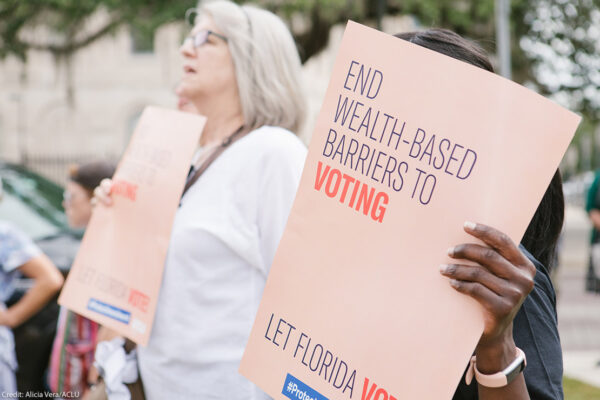Federal Trial Concludes in Challenge to Florida Law That Undermines Voting Rights Restoration
TALLAHASSEE, Fla. — A federal trial that will impact the right to vote for hundreds of thousands of Floridians concluded May 6, 2020, after more than a week of testimony and arguments.
The American Civil Liberties Union, ACLU of Florida, NAACP Legal Defense and Educational Fund, Brennan Center for Justice at NYU Law, Campaign Legal Center, and Southern Poverty Law Center were in court challenging the Florida law that creates wealth-based hurdles to voting and undermines Floridians’ overwhelming 2018 passage of Amendment 4, which extended voting rights to over a million people.
The trial was conducted remotely via the U.S District Court for the Northern District of Florida. The groups secured a preliminary injunction in October 2019, which was upheld by a federal appeals court earlier this year. Those rulings explicitly applied to the 17 plaintiffs named in the case, but a favorable court ruling stemming from this trial would apply to all those impacted by the 2019 Florida law.
The following comments are from:
Julie Ebenstein, senior staff attorney with the ACLU’s Voting Rights Project: “We are hopeful the court will find that the right to vote cannot depend on wealth and permanently strike down this law.”
Orion Danjuma, senior staff attorney with the ACLU’s Racial Justice Program: “There is simply no justification for barring people from voting because they are too poor to pay.”
Daniel Tilley, ACLU of Florida legal director: “Florida politicians may try all they can to obstruct access to voting, but our commitment to restoring the right to vote to every eligible Florida voter is unwavering. Taking Gov. DeSantis to court for enacting a modern-day poll tax in Florida is a testament to that. Senate Bill 7066 is unconstitutional and violates one of our most fundamental rights: the ability to make our voices heard at the ballot box. It is how we are able to have a say in the governance of our communities and in outcomes that affect our everyday lives. It is a right that must be protected at all costs. It has been an honor to have stood alongside our brave clients throughout this week-long trial. It is because of them, and the hundreds of thousands of returning citizens they represent, that we have been able to stay in the fight against this wealth-based hurdle to voting. We believe in restoring their right to vote once and for all — and hope the court will decide on the side of democracy, human dignity, and the will of Florida’s voters.”
Sean Morales-Doyle, senior counsel at the Brennan Center for Justice at NYU Law: “Over the past week, we’ve heard the state defend trying to put a price tag on the right to vote. That should not stand. We look forward to the court's final judgment. Once again, we heard overwhelming evidence that SB 7066 violates the Constitution. We heard loud and clear that this law discriminates against black and low-income Floridians and unfairly condemns hundreds of thousands of citizens to permanent disenfranchisement.”
Leah C. Aden, deputy director of litigation at the NAACP Legal Defense and Educational Fund: “At trial, via expert testimony of Dr. J. Morgan Kousser and other evidence, the Gruver plaintiffs identified what was commonly understood and made clear to the Florida Legislature before they enacted SB7066 — that the law would disproportionately impact black returning citizens because of its legal financial obligations (LFO) requirement and, as detailed by Dr. Traci Burch’s research, the state’s utter failure to have up-to-date records about what people owe. The testimonies of plaintiffs Curtis Bryant and LaToya Moreland represented the experiences of hundreds of thousands of black returning citizens who are harmed by the state’s irrational and discriminatory law designed to render them ineligible to vote. This law, and the defiant removals of more than 200 voters because of LFO debt by the Manatee County Supervisor of Elections, are the types of voter restrictions that the U.S. Constitution prohibits. SB7066’s LFO requirement must not stand.”
Danielle Lang, co-director of voting rights and redistricting at Campaign Legal Center: “The outcome of this trial should be a rejection of wealth-based voting standards and clarity on eligibility for all Floridians. A uniform process for determining voting eligibility must be clearly communicated and Florida must discontinue its practice of discriminating against voters due to lack of wealth.”
Nancy Abudu, deputy legal director for the Southern Poverty Law Center: “As plaintiffs demonstrated over the past week and a half at trial — if you are rich, if you are white, and if you are male in Florida, you have a much higher probability of being exempt from the onerous financial requirements Senate Bill 7066 imposes as a condition to vote. The goal of Amendment 4 was to restore voting rights to those who have been locked out of the democratic process with no political voice in the very issues that affect their daily lives. We truly hope the court will honor the spirit of Amendment 4 and protect our clients’ fundamental right to vote.”
Case details: /cases/gruver-v-barton
